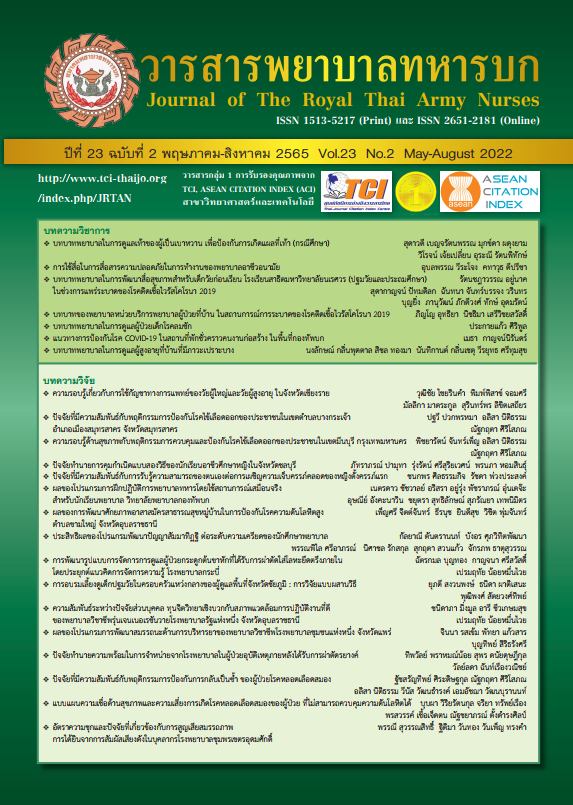Causal Factors Affecting Disaster Response Of M-MERT, Army Hospital Under Army District In Thailand
Keywords:
Medical Emergency response team, Disaster response Participation, The command and directionAbstract
Disaster Management focus on saving lives provide relief and face situations in crisis when disasters have already occurred. The Royal Thai Army Medical Department has prepared Military Medical Emergency Response Team: M-MERT They must be trained. This research is an analytical study of the causal factors influencing disaster response during the emergency response period of the Military Medical Response Team with variable Personal, the Commanding and Directing, participation and disaster response. Objective:1) To study the disaster response in the emergency response stage of the Military Medical Response Unit 2) To develop a causal factor model influencing disaster response in the emergency response period of the Medical Response Unit and 3) to study the direct and indirect influences of causal factors influencing disaster response in the emergency response period of the Military Response Team. The researcher collected the research data with the Military Medical Emergency Response unit, and personnel previously designated to perform duties, amounting to 424 people from 30 Army District hospital by using developing questionnaires confirm validity test with variable. Data were analyzed by frequency, percentage by computer program that analysed Structural equation model and Correlation. Result: It was found that, the perception of the capability of the M-MERT Awareness every variables are moderate to high. The causal factor model influencing disaster response consistent with the empirical data. All of variable positively influences disasters response significant below .05
Downloads
References
Chuwong U., Nakrob T., Wongtham S. Developing People’s Potential in Chanthaburi Municipality for Disaster Management. King Prajadhipok’s Institute, 2012.
Department of Disaster Prevention and Mitigation. Glossary of disaster risk management terminology. Bangkok: Ministry of Interior; 2014:94-5. (in Thai)
Siripukdeekan C, Kasiwiwat T. Lessons learned of Military Medical Emergency Response Team (M-MERT) in assisting and caring the earthquake victims in Nepal. Journal royal thai nurse 2018;19(1), 93-104. (in Thai)
Strategic Studied Centre. Thailand outlook and paradigm shift towards ASEAN community 2015. Bangkok: National Defence Studied Institute; 2012:3-4. (in Thai)
Aitken P, Wiltshire M. Parental satisfaction with a nurse-led emergency assessment unit. Paediatric Nurs. 2005;17(9):31-5. (in Thai)
Aieminthra G. Samui emergency plan [Thesis]. Bangkok: Thammasart University; 2016:56-61 (in Thai)
Seedam I. Factors affecting the implementation of the peace building process in the four southernmost provinces of Thailand policy: a case study of Pattani province [Thesis]. Nakhon Pathom: Mahidol University; 2010:8-9 (in Thai)
Department of Disaster Prevention and Mitigation. Disaster risk reduction. Bangkok: Ministry of Interior; 2016:94-5. (in Thai)
Etkin D. Disaster theory: an interdisciplinary approach to concepts and causes. Oxford, UK: Butterworth-Heinemann;2016:142-5.
Agranoff & McGuire. Collaborative Public Management: New Strategies for Local Governments Georgetown University Press, 2003.
Downloads
Published
How to Cite
Issue
Section
License
Copyright (c) 2022 Journal of The Royal Thai Army Nurses

This work is licensed under a Creative Commons Attribution-NonCommercial-NoDerivatives 4.0 International License.
บทความหรือข้อคิดเห็นใดใดที่ปรากฏในวารสารพยาบาลทหารบกเป็นวรรณกรรมของผู้เขียน ซึ่งบรรณาธิการหรือสมาคมพยาบาลทหารบก ไม่จำเป็นต้องเห็นด้วย
บทความที่ได้รับการตีพิมพ์เป็นลิขสิทธิ์ของวารสารพยาบาลทหารบก
The ideas and opinions expressed in the Journal of The Royal Thai Army Nurses are those of the authors and not necessarily those
of the editor or Royal Thai Army Nurses Association.






